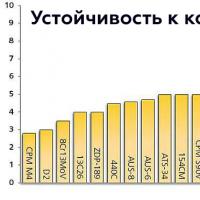Marketing in English
Foreign partners, international exhibitions, special literature - knowledge of the English language allows a marketer to reach a new level. We will discuss the names of specialized specialties, as well as expressions associated with the cornerstones of marketing: product and brand.
Brand
In the field of marketing, there are unusually many borrowings from the English language. Is it any wonder that many of the terms are understandable even without translation. Let's say the phrase “ brand image"Can be conveyed in Russian in the form of" brand image ", but even without translation it is clear that it comes how the product is perceived by the consumer. A typical example of the use: " The new lower price of this chocolate doesn’t go well with its brand image”(“ The new, lower price of this chocolate does not correspond to the brand image ”). As can be seen from the context, this refers to a brand that has traditionally been perceived as a luxury brand.
The same can be said about “ brand loyalty»: The phenomenon of loyalty, brand loyalty is understandable intuitively. Surely you yourself have experienced it yourself more than once, coming to the store and habitually choosing a drink, sweets, perfumes or cosmetics of your favorite brand.
At the same time, there are expressions that are difficult to understand without translation. This, in particular, “ brand equity". In Russian, this term is usually rendered as follows: "brand capital", "brand value". Need an example? Then remember how willingly people overpay for a bottle of Coca-Cola, ignoring the drink of a little-known brand, which, perhaps, is not inferior in quality. It is from this overpayment that the aforementioned "brand capital" is formed, or " brand equity».
We also note a number of "brand" expressions.
Product
The product can belong to different price categories, be targeted at buyers with different capabilities. Thus, a product designed for a mass consumer belongs to the “mass market” sector (“ mass-market product"), And its dear opposite was called" prestige product».
In a special group, marketers distinguish the so-called price-sensitive goods (“ price-sensitive products"). This means that the demand for them falls noticeably with an increase in price and increases with a decrease.
Another curious category is interchangeable products, or substitute goods (" substitute products"). The pharmaceutical market can illustrate this concept: there are a number of drugs created on the basis of the same active substance, but produced by different companies and under different names.
In addition, when discussing a product, you may need the following expressions:
| Gasoline is a price-sensitive product as many people can drive several miles to get a few cents off. | Gasoline is a price-sensitive commodity, as many people travel several kilometers to buy it a few cents less. |
| Today we’ll discuss the new product line during the conference with the head of our company - it will be hold in English via skype. | Today we will be discussing the new product line at a conference with the head of the company - it will be held in English via Skype. |
| The same type of drug branded under several different names is a good example of substitute products. | Same medicine sold under different brands - good example interchangeable goods. |
| Eyeglasses and contact lenses are substitute products. | Glasses and contact lenses are interchangeable goods. |
| What brand of perfume do you prefer? | What brand of perfume do you prefer? |
| We're going to launch the new product next week. | We're going to run new product on sale next week. |
The field of marketing is constantly updated with new English words.

Marketing professions
The names of many specialties are tracing paper from the English language, and therefore it is not at all difficult to remember them. Suffice it to note, say, “ brand manager("Brand manager"), " director of marketing" ("marketing director"), " copywriter("Copywriter"). Interesting case - " graphic designer". The name of the profession will be translated differently depending on the field in which this specialist works: it is acceptable to have a "graphic designer", and a "printing artist" and "graphic designer".
Here are a few more professionals who may work in marketing or related fields:

For professionals and marketing managers
Situation:
You are a marketing manager (or intend to become one),
Your manager (or business partner) speaks English but does not speak Russian.
You need to gain or update your knowledge in the field of marketing and it is desirable to improve your English.
If this situation is familiar to you, then this course is especially for you.
What are you getting?
- New ideas and knowledge about marketing
- Practical tools for their application in the work of a marketer
- Participate without complexes in meetings at English language on questions marketing activities your company
- Present your company, product, service in English
- Go on business trips abroad, to exhibitions, seminars, conferences without an interpreter
- Everyone is happy with you, you are growing.
How are the lessons going?
We present not outdated information, but modern concepts, problems and strategies for applying marketing, illustrating the theory with examples and leaving a significant amount of time for productive discussions. In addition, in each lesson we perform practical exercises on the topic studied.
Sample Program Workshop Topics Marketing in English: towards Advertising agent:
- Copywriting and writing of advertising texts
- Advertising Marketing
- Interior and exterior advertising design
- Development of a creative concept of an advertising product
- Technique and technologies of advertising video
- The Basics of Advertising in the Hospitality Industry
- The Basics of Advertising in the Beauty and Fitness Industry
- The Basics of Restaurant Advertising
- Marketing communications in the beauty and fitness industry
- Advertising and public relations
The materials we work with depend on the level of English proficiency. Attention! Perhaps, passing the course in Russian, and in English - only basic concepts.
Business marketing
Marketing is the process of planning and executing the conception, pricing, promotion, and distribution of ideas, goods, and services to create exchanges that satisfy individual and organizational goals.
Exchangeis the key term in the definition of marketing. The concept of exchange is quite simple. Ideal that people give up something to receive something they would rather have. It means that people give up something to receive something they would rather have. Normally we think of money as the medium of exchange. We "give up" money to "get" the goods and services we want. Exchange does not require money, however. Two persons may barter or trade such items as baseball cards or oil paintings.
Five conditions must be satisfied for any kind of exchange to take place:
· There must be at least two parties.
· Each party must have something the other party values.
· Each party must be able to communicate with the other party and deliver the goods or services sought by the other trading party.
· Each party must be free to accept or reject the other "s offer.
· Each party must want to deal with the other party.
Exchange will not necessarily take place even if all these conditions exist. They are, however, necessary for exchange to be possible. For example, you may place an advertisement in your local newspaper stating that your used automobile is for sale at a certain price. Several people may call you to ask about the car, some may test- drive it, and one or more may even make you an offer. All five conditions are necessary for an exchange to exist. But unless you reach an agreement with a buyer and actually sell the car, an exchange will not take place. Notice that marketing can occur even if an exchange does not occur. In the example just discussed, you would have engaged in marketing even if no one bought your used automobile.
Business marketingis a marketing practice of individuals or organizations (including commercial businesses, governments and institutions). It allows them to sell products or services to other companies or organizations that resell them, use them in their products or services or use them to support their works.
Business marketing is also known as industrial marketing or business-to-business (B2B) marketing. Despite sharing dynamics of organizational marketing with marketing to governments, business-to-government marketing is different.
Business-to-business marketing is the marketing of goods and services to individuals and organizations for purposes other than personal consumption. The sale of an overhead projector to your college or university is an example of business-to-busi- ness marketing. Business-to-business products include those that are used to manufacture other products, that become part of another product, that aid the normal operations of an organization, or that are acquired for resale without any substantial change in form. The key characteristic distinguishing business-to-business products from consumer products is intended use, not physical characteristics. A product that is purchased for personal or family consumption or as a gift is a consumer good. If that same product, such as a microcomputer or a cellular telephone, is bought for use in a business, it is a business-to-business product.
Marketing is the business function that identifies customer needs and wants, determines which target markets the organization can serve best, and designs appropriate products, services, and programs to serve these markets. However, marketing is much more than just an isolated business function - it is a philosophy that guides the entire organization. The goal of marketing is to create customer satisfaction profitably by building value-laden relationships with important customers. The marketing department cannot accomplish this goal by itself. It must team up closely with other departments in the company and partner with other organizations throughout its entire value-delivery system to provide superior value to customers. Thus, marketing calls upon everyone in the organization to “think customer” and to do all they can to help create and deliver superior customer value and satisfaction. As Professor Stephen Burnett of Northwestern puts it, “In a truly great marketing organization, you can’t tell who’s in the marketing department. Everyone in the organization has to make decisions based on the impact on the customer ”.
Although marketing is all around us and we all need to know something about it, most people are surprised to find out that marketing is so widely used. Marketing is used not only by manufacturing companies, wholesalers, and retailers but by all kinds of individuals and organizations. Lawyers, accountants, and doctors use marketing to manage demand for their services. So do hospitals, museums, and performing-arts groups. No politician can get the needed votes and no resort the needed tourists without developing and implementing marketing plans.
People at all levels of these organizations need to know how to define and segment a market and to develop need-satisfying products and services for chosen target markets. They must know how to price their offerings to make them attractive and affordable and how to choose middlemen to make their products available to customers. And they need to know how to advertise and promote products so that customers will know about and want them. Clearly, marketers need a broad range of skills in order to sense, serve, and satisfy consumer needs.
People also need to know about marketing in their roles as consumers and citizens. Because someone is always trying to sell us something, we need to recognize the methods they use. And when students enter the job market, they must conduct "marketing research" to find the best opportunities and develop the best ways to "market" themselves to prospective employers. Many students will start their careers with marketing jobs in salesforces, in retailing, in advertising, in research, or in one of a dozen other marketing areas.
What does the term marketing mean? Many people mistakenly think of market¬ing only as selling and promotion. And no wonder - every day, people are bombarded with television commercials, newspaper ads, direct mail, and sales calls. It seems that we cannot escape death, taxes, or selling.
Therefore, many people are surprised to learn that selling is only the tip of the marketing iceberg: It is but one of several marketing functions - and often not the most important one. If the marketer does a good job of identifying consumer needs, developing good products, and pricing, distributing, and promoting them effectively, these goods will sell very easily.
Everyone knows something about "hot" products to which consumers have flocked in droves.
 Comments Off Order 8 tsz ojsc rzd read
Comments Off Order 8 tsz ojsc rzd read Peculiarities of determining the cruising speed when drilling with cc shells How to calculate the mechanical speed of drilling
Peculiarities of determining the cruising speed when drilling with cc shells How to calculate the mechanical speed of drilling Automated electric drive course of lectures
Automated electric drive course of lectures Powder steel crucible cpm s30v
Powder steel crucible cpm s30v How to open a medical center from scratch?
How to open a medical center from scratch? Comic, funny scenes for teenagers and adults
Comic, funny scenes for teenagers and adults Diploma templates blank download
Diploma templates blank download